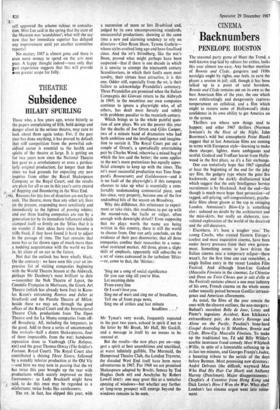Backnumbers
CINEMA PENELOPE HOUSTON
The seasonal party game of Hunt the Trend, a well-known trap laid by editors for critics, looks this year almost too easy. Any further mention of Bonnie and Clyde, gangsters and 1930s nostalgia ought by rights, one feels, to earn the player a session in jail; still, though it has been talked up to a point of total boredom, Bonnie and Clyde remains out on its own as the best American film of the year, the one which most exhilaratingly and dangerously captures temperament on celluloid, and a film which (night to restore some of Hollywood's shaky confidence in its own ability to get America on to the screen.
Thrillers are where new things tend to happen; and other 1967 thrillers (Norman Jewison's In the Heat' of the Night, John Boorman's wild but atmospheric Point Blank) suggest that at last American films are coming to terms with European style—learning to make them sharper, lighter, more ambiguous and zestful. Godard and Truffaut learnt from Holly- wood in the first place, so it's a fair exchange.
One can tentatively hope that 1967 signalled at least the beginning of the end for the joky spy film, the gadgety type where the gung. fire backwards, and. the darkly disillusioned kind which suggest that the only Intelligence Service recruitment is by blackmail. And the end—this though is much more hope than persuasion--of ragged, self-pitying, self-congratulatory, psyche- delic films about gloom at the top in swinging London. Antonioni's Blow-Up is something else : seduced no doubt by the architecture and the mini-skirts, - but really an elaborate, con- voluted exploration of the'world of the deceived and the self-deceivers.
Elsewhere, it's been a tougher year: The young Czechs, who created Eastern Europe's coolest and most inquisitive cinema, have been under heavy pressure-from their own govern- ment. Something seems to have driven the Italian cinema into a temporary eclipse—there wasn't, for the first time one can remember, a tingle Italian entry in the recent London Film Festival. And although Jean-Luc Godard - (Masculin Feminin in the cinemas; La Chinoise and Deux ou Trois Choses que je sais d'elle at the Festival) sustains almost a one man industry of his own, French cinema on the whole seems rather uneasily poised between Gaullist intransi- gence and American allurements.
As usual, the films of the year remain the ones with the clearest outlines, the non-mergers : Bufiuel's succulent Belle de Jour, Losey and Pinter's ingenious Accident, Kon Ichikawa's extraordinary pair, An Actor's Revenge and Alone on the Pacific, Pasolini's bone-hard - Gospel According to St Matthew, Bonnie and .Clyde, Blow-Up, Masculin Feminin. To make up the traditional ten, I'd add Billy Wilder's acerbic insurance fraud comedy Meet Whiplash Willie, in spite of a lamentable softening up in its last ten minutes, and Georges Franju's Judex, a haunting tribute to the serials of the days before Batman. Most promising new directors: Andre Delvaux (the difficult, wayward Man Who Had His Hair Cut Short) and Anthony Harvey (Dutchman). Major disappointments Chaplin's A Countess from Hong Kong and Dick Lester's How 1 Won the War. What else? London's last cinema organ went into retire- ment.










































 Previous page
Previous page